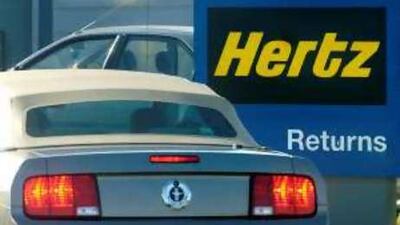"Staycationers" are helping local car hire companies stave off the impact of the global travel industry slowdown. Vehicle rental companies across the Emirates are seeing a rise in business as economic fears and job insecurity prompt more people to holiday at home and hire cars instead of buy them.
Despite the economic hardship businesses suffered as a result of the financial crisis, the car rental sector is bucking a trend that is punishing many other travel industry businesses. Car hire revenues reached Dh669 million (US$182.1m) last year, a 6 per cent increase over the Dh631m worth of rentals the previous year, according to the market research company Euromonitor International. Some hire companies are reporting even better results. The 742 car rental operators in the UAE performed 2 million transactions using their combined fleet of 45,600 cars, according to Euromonitor.
"Our rental revenues are up by almost 10 per cent as compared to 2009, as are the number of cars rented," said Sumit Chopra, the general manager for National Car Rental. At the Dollar Rent a Car arrivals desk at Sharjah Airport, the manager Shariel Asazo is also being kept busy and not just by people flying into the airport. "We are an airport location but lately there are a lot of people who rent from here just walking in from around Sharjah, not flying in from elsewhere," she said.
The car-hire sector is expected to continue expanding through to 2014, according to Euromonitor, with the value of the industry predicted to reach Dh880m by then. Figures from the World Tourism Organisation show more than 31 per cent of UAE residents are choosing domestic tourism over travelling abroad, compared with 11 per cent a year earlier. Residents took 3.6 million domestic holiday trips last year, a 15 per cent increase on the 3.1 million taken in 2008.
Dubai was the leading destination with domestic tourists making about 1.6 million holiday trips to the emirate, followed by Abu Dhabi with 1.3 million trips. Travel agencies report a rise in demand for local packages from increasingly cost-conscious customers. "Since last summer we have seen a growing numbers of people looking for domestic holiday packages," said Omeed Askari, a sales executive for Al Rais Tourism, a domestic holidays arm of Al Rais Travel. For many, a domestic holiday has been an eye-opener.
"We stayed in Al Ain last year because we couldn't afford to travel abroad but I absolutely loved it," said Dina Jaffar, a Sharjah resident. Before the economic downturn, many residents preferred to travel to Europe and Asia for their holidays. When the downturn hit, it forced people to cut down on expenses. That included choosing cheaper domestic holidays, which in turn helped the local tourism and car rental sectors.
"In difficult times, you have to find ways of saving money but still enjoy a decent holiday," said Daniel Khokhar, a Sharjah businessman. "So we just rented a car and drove to Oman to spend few days there." Continued economic uncertainty is also prompting more consumers to postpone expensive car purchases. "It's to do with the downturn, with people not wanting to commit to buying if their job is insecure," said Kim Perks, Euromonitor's communications executive for the MENA region. Most people use bank loans to buy cars and residents are hesitant to sign up to a prolonged financial commitment during a time when the economy and their employment are still on shaky ground.
UAE consumers spent a total of $3.14bn on new and used vehicles last year, a 2.7 per cent drop from the previous year, according to Euromonitor. While global car sales grew by 13 per cent in the second quarter of this year from the same period a year earlier, that represented a significant slowdown on the 25 per cent increase recorded in the first three months of this year, according to a report by Scotiabank Group. The drop-off was attributed, in part, to a sharp fall in car sales in Europe.
business@thenational.ae

